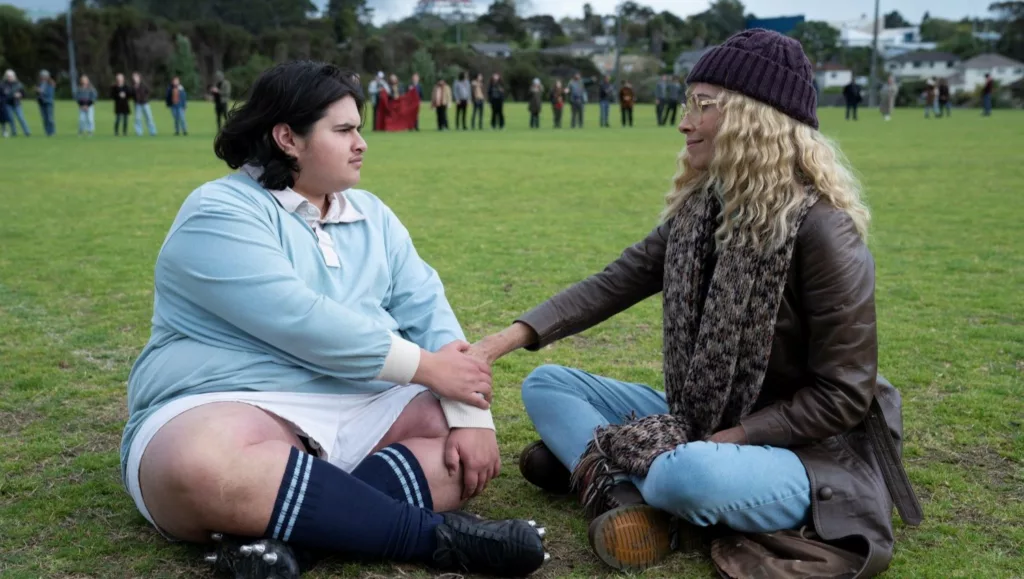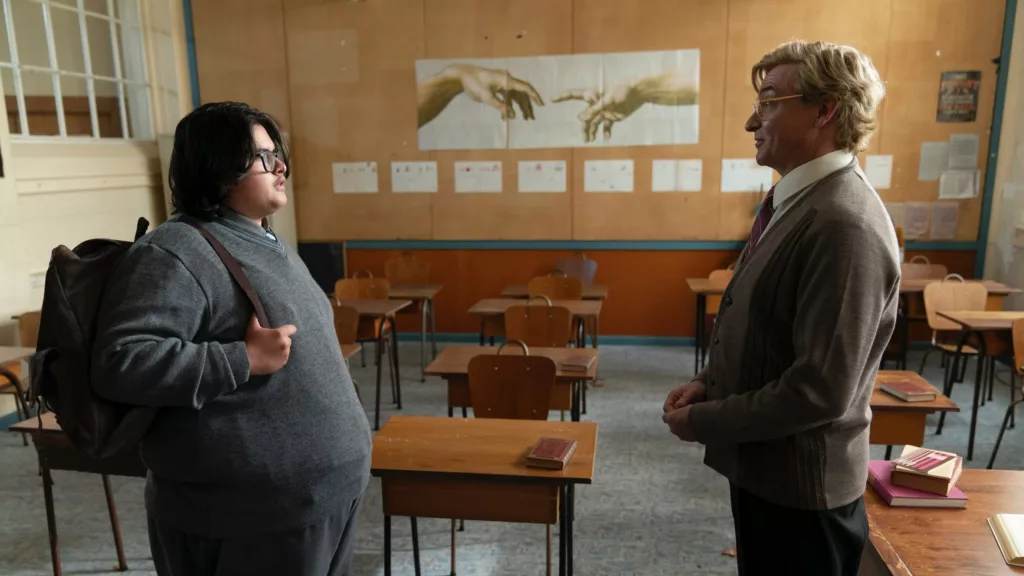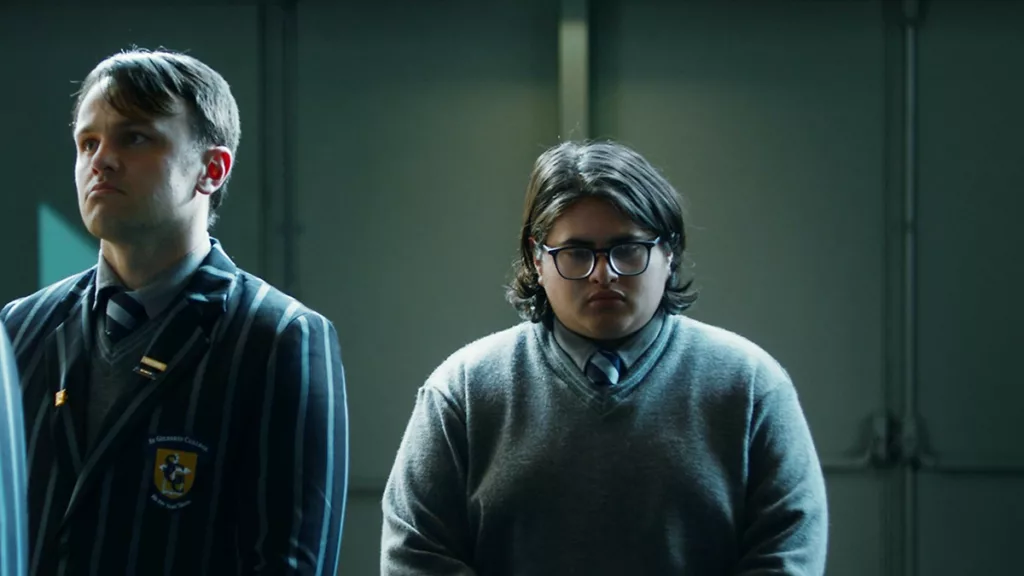Set amongst the hills of 1980s Dunedin, New Zealand, Uproar tells the coming-of-age story of Josh Waaka, a 17-year-old finding his way in a complex world. Directed by Paul Middleditch and Hamish Bennett, the film explores Josh’s journey as he navigates family expectations, cultural identity, and an awakening political consciousness during a time of unrest.
With his Māori father deceased, Josh grows up helping support his widowed mother Shirley and injured brother Jamie. He attends a predominantly pākehā (white) Christian school, trying to keep a low profile as one of the few Māori students.
But when protests erupt against hosting South Africa’s apartheid-era rugby team, Josh finds his eyes opening to injustice—and to talents of his own—through a supportive drama teacher. Between family duties, an unexpected flair for performance, and surging social divides, Uproar follows Josh’s path to self-discovery.
Uproar in Dunedin
It’s 1981 in the coastal city of Dunedin, New Zealand. Tensions are running high as the controversial tour of the South African rugby team, known as the Springboks, has divided the nation. For 17-year-old Josh Waaka, these political divides are playing out in his own life.
Josh is a student at the nearly all-white St. Gilbert’s School for Men. As one of the few Māori students, he often finds himself an outsider. His father passed years ago, and his mother Shirley works as a cleaner at the school to provide for Josh and his older brother Jamie. Once a star rugby player, an injury has ended Jamie’s career and deepened his struggles with depression.
At school, Josh keeps to himself to avoid the jeers of classmates who mock his heritage. His talents lie elsewhere; he has a gift for memorization and a sly wit. When drama teacher Brother Madigan invites Josh to join the new school play, it opens the door to a passion. But Shirley doesn’t view the arts as a practical path, pushing Josh to instead focus on rugby like the men in his family.
As protests ignite over the Springboks tour, divisions grow within the community. Josh finds his own views changing as he spends time with student activists like the fiery Samantha. He begins to see parallels between the oppression faced by Māori in New Zealand and the racist apartheid system in South Africa. His eyes are opened to the prejudice at his school as well.
Caught between his family’s expectations, his newfound acting ambitions, and the political awakening happening around him, Josh must decide which role he will play and who he wants to be. In turbulent times, navigating his identity proves the biggest test yet for this thoughtful young man coming into his own.
Finding His Place
Josh Waaka faces challenges fitting in at his predominantly white high school in 1980s New Zealand. As a teen coming to terms with his Māori and British heritage, he struggles to feel accepted by peers who tease him about his weight and ethnicity. Deep down, Josh longs to connect with his Māori roots but feels distant from that culture since his father passed.
These identity issues are exacerbated by external expectations. Josh’s family has pressured him to emulate his star rugby player brother, even though his true passion lies elsewhere. He plays rugby just to please others, finding little joy in the game. Josh also senses the school only values students who bring titles, like his brother once did. This leaves Josh feeling like an outsider with nothing to offer.
Yet underneath Josh’s shy, sarcastic exterior lie hidden talents waiting to bloom. When drama teacher Brother Madigan invites him to join the secret theater club, Josh amazes with his memorized monologue. For the first time, Josh feels fulfillment in expressing himself creatively rather than striving to live up to others’ ideals. Unfortunately, his mother disapproves of acting’s instability as a career.
Caught between these various pressures, Josh struggles to find his place until political tensions arise. As protests fill the streets against apartheid-era South Africa’s rugby tour, Josh starts questioning society’s treatment of indigenous peoples. He recognizes parallels in the racism faced by Māori and blacks in South Africa. For the first time, Josh understands how discrimination shapes both global issues and his personal experiences.
Witnessing the inspiring defiance of activists like Samantha and Auntie Tui plants seeds of conviction in Josh. While he still grapples with his heritage, the protests spark Josh’s curiosity to learn more about his identity and stand up against oppression. Brother Madigan also encourages Josh’s burgeoning confidence, seeing his humanity beyond surface attributes. Under their guidance, Josh begins his journey toward self-acceptance, using his voice to enact change.
Uprooting Expectations
Josh Waaka’s story is one of navigating change during challenging times. Growing up in 1980s New Zealand, he finds himself drawn towards avenues his family doesn’t necessarily envision. As protests erupt around controversial rugby matches, Josh gains a new perspective on both politics and his cultural identity.
Like many teenagers, Josh faces pressure to meet others’ expectations. As the son and brother of respected rugby players, sports are viewed as his path. But when a drama teacher spots Josh’s gift for memorization, a door opens to pursuits. Josh enjoys it more. His mother and brother encourage the traditional route, hoping it will support the family. But Josh’s heart may lead elsewhere.
Caught between these influences, Josh takes time to realize his own direction. He comes to see how tightly linked politics and identity can be. In a mostly white school, Josh has long avoided acknowledging his Māori roots. But the apartheid issue sparks questions about his background and how society treats those of mixed race. Grace, proud of her Samoan ancestry, nudges Josh to reflect more deeply.
Through it all, Josh forms his own conclusions. He comes to see that deciding your own way forward sometimes means upsetting the status quo. While daunting, embracing who you are with empathy and courage can inspire positive change. Josh’s journey is universal, showing the struggles all young people face in establishing independence and self-definition against societal pressures. By the film’s end, he proudly asserts himself as both an actor and an activist, rejecting the limits others aim to impose.
Josh’s story uplifts by demonstrating that inner truth and solidarity can triumph over division. Even in turbulent times, we each shape our own future by thinking for ourselves and supporting others to do the same.
Discovery and Awakening
Set against a period of political upheaval, Uproar tells a deeply personal story of self-discovery and coming into one’s own. At its heart is Josh, a biracial teenager navigating identity and purpose amid conflicting pressures. He longs to express himself, yet he fears stigma may limit his options.
Paul Middleditch drew from his own past, crafting a tale that resonates for its authenticity. With co-writer Hamish Bennett, he blends weighty themes into an uplifting narrative. Serious issues are raised, but never in a way that is too heavy-handed. The film finds levity even in challenging moments, reflecting life’s diverse tones.
This balanced approach allows complex characters to feel fully realized. Minnie Driver and Julian Dennison are standouts for leading genuine, empathetic performances. Their relationship, with all its nuances, proves quite moving. In a similar fashion, the diverse student body and community appear wholly dimensional.
By placing his protagonist’s discoveries at the forefront, Middleditch presents a story anyone can connect with. Though rooted in a specific time and place, its exploration of identity speaks to universal struggles. With deft direction and writing, Uproar emerges as an artful, inspiring film sure to resonate long after.
The Power of Protest
Set in 1981 in Dunedin, New Zealand, Uproar arrives amid a time of intense social upheaval. As anti-apartheid demonstrations disrupted the tour of the racist South African rugby team, divisions were opening in New Zealand society. Some argued for “unity” by ignoring issues of race and viewing protests as threats to national pride. But for Māori like Josh Waaka, the protests reflected longstanding grievances with colonization and a lack of recognition for indigenous rights.
Through Josh’s eyes, we experience the drama and confusion of that moment. As a high school student, his primary concerns were sports, friends, and finding his place. But the demonstrations forced larger questions upon him.
Watching passionate protesters like Samantha and Auntie Tui, he began to see similarities between Māori dispossession and the policies oppressing black South Africans. Comments from racist peers and the reactionary principal also highlighted ongoing prejudice, shaking Josh’s understanding of his mixed heritage.
By setting the coming-of-age story against this vivid backdrop of real-world change, Uproar brings to life a slice of 1980s New Zealand. We observe daily Kiwi life through scenes like Josh’s paper route or family dinners. But we also see how international events intruded, polarizing the local community.
For Josh, grappling with his activist friend’s perspectives alongside family pressures to conform, the protests symbolized possibilities beyond the assimilated path set out for him. His political awakening emerged from lived experience, echoing how societies evolve through generations standing up for justice.
Empathy and Identity: The Heart of Uproar
Uproar tells a resonant story of self-discovery amidst social change. At its core, it’s about a young man grappling with questions about who he is and where he belongs. Josh Waaka grows up feeling caught between cultures, unsure how to connect with his Māori roots after losing his father. When protests erupt over New Zealand’s treatment of indigenous peoples and support for apartheid South Africa, he’s pushed to reflect on injustice and find his voice.
Josh’s journey exemplifies the challenges many face in establishing their identity. Societal expectations pull him toward assimilation, while a teacher and friends spark curiosity about other paths. He comes to understand that individual strengths arise from embracing their full heritage, not denying parts deemed inconvenient. His story encourages appreciating how personal experiences link to wider movements and recognizing the shared humanity across apparent differences.
Directors Paul Middleditch and Hamish Bennett craft a story with heart and nuance. They tackle weighty issues but never feel preachy, instead bringing humor and empathy to all their characters. Julian Dennison also shines as Josh, letting viewers connect with a shy boy awakening to brave new realities. The film serves as an inspirational tale of standing up for principles when it matters most, all while retaining compassion for others’ perspectives.
Uproar presents a slice of history that is still meaningful today. Its messages of cultural pride, open-mindedness, and solidarity ring as important as ever. For anyone wanting insight into the challenges of identity and society’s role in shaping one’s path, this gem of New Zealand cinema deserves watching with an open mind and heart.
The Review
Uproar
Uproar offers a thoughtful, nuanced portrayal of self-discovery that feels both timely and timeless. Directors Middleditch and Bennett, along with star Dennison, craft a poignant coming-of-age story that entertains while imparting important lessons of empathy, compassion, and standing up against injustice. Though potentially predictable in parts, the film's heart and authentic characters ensure it remains an impactful slice of New Zealand cinema.
PROS
- A thought-provoking exploration of identity and social change
- Strong lead performance by Julian Dennison
- Humorous yet nuanced writing and directing
- Authentic depiction of 1980s New Zealand setting and politics
- Encourages appreciation for minority voices and perspectives
CONS
- Some predictable story beats
- Occasional tonal inconsistencies
- Could explore key issues like racism in even greater depth.





















































